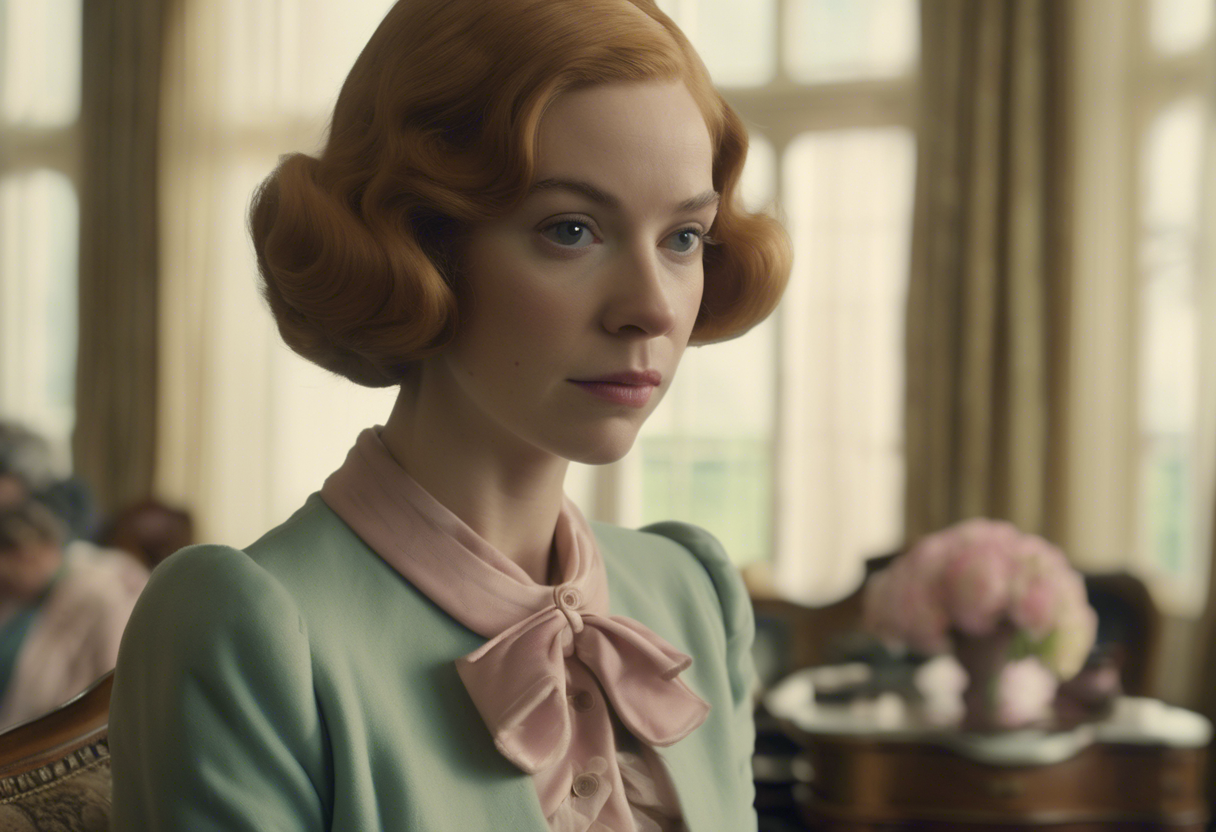Alma Wheatley is a pivotal character in the Netflix limited series The Queen’s Gambit, serving as the complex adoptive mother and early mentor to the protagonist, Beth Harmon. Introduced as a seemingly conventional and reserved suburban housewife married to Allston Wheatley, Alma’s backstory reveals a woman whose youthful ambitions — particularly her dream of becoming a pianist — were sidelined by societal expectations and a loveless marriage. Her adoption of Beth from an orphanage marks a turning point in both their lives, as Alma breaks free from her stifling past and develops an unorthodox yet deeply nurturing bond with Beth. Alma’s character challenges stereotypes of foster motherhood by embodying vulnerability, resilience, and a nuanced portrayal of addiction and personal freedom. Within The Queen’s Gambit, she plays a crucial role in Beth’s emotional development, supporting her chess career while grappling with her own struggles, especially alcoholism. Alma’s narrative arc highlights themes of female agency, redemption, and the complexities of surrogate family dynamics, connecting to broader media traditions of multifaceted maternal figures and women reclaiming autonomy in mid-20th-century America [1][2].
Contents
Role in the Series
Alma Wheatley’s storyline begins when she and her husband Allston arrive at the orphanage to adopt Beth. Initially, Alma fits the mold of a submissive, traditional wife, depicted in modest attire and bound by her marriage’s limitations. However, her life shifts dramatically after Allston abruptly abandons her and Beth, leaving Alma financially strained and forced to fend for herself and her adopted daughter. This abandonment paradoxically liberates Alma, allowing her to shed societal constraints and embrace a more assertive identity.
As Beth’s chess talents emerge and grow, Alma becomes her closest ally and manager, traveling with Beth to tournaments across the United States and Mexico. During this period, Alma rekindles a romantic relationship through correspondence with a pen pal named Manuel, fulfilling a long-deferred personal dream. However, Alma’s drinking intensifies alongside her newfound assertiveness, reflecting a complex coping mechanism amid loneliness and disappointments.
The series also explores the ambivalence in Alma’s relationship with Beth. Despite Alma’s maternal affection and support, viewers are left uneasy at moments, questioning whether Alma’s alcoholism and insecure position might harm Beth. The tension culminates in Alma’s unexpected death due to hepatitis while they are in Mexico City. This loss profoundly impacts Beth, thrusting her into a deeper confrontation with her vulnerabilities and catalyzing her continued rise as a chess champion [1][2][3].
Character Analysis
Alma Wheatley’s personality is marked by a blend of fragility and strength. She is deeply relatable as a woman who once deferred her passions to societal expectations but rediscovers a sense of purpose through adopting Beth and managing her chess career. Alma’s motivations stem from a yearning both for personal fulfillment and connection, which she finds in Beth’s success and their growing bond.
Her strengths lie in her emotional openness and loyalty, qualities that create an atypically tender maternal relationship. Alma’s flaws—chiefly her alcoholism and dependence on external validation—add complexity, rendering her neither an idealized mother figure nor a villain. This ambiguity invites empathy and represents the messy realities of people coping with trauma and loss.
Alma develops over the series from a submissive, almost ghostly figure into a woman who asserts her desires and navigates the challenges of single parenthood and addiction. Her evolution underscores themes of redemption and self-reclamation, making her a compelling character whose personal struggles unfold alongside Beth’s rising star [1][2][3].
Themes and Symbolism
Alma Wheatley embodies several key themes in The Queen’s Gambit, including freedom versus constraint, the pursuit of dormant dreams, and the complexity of surrogate motherhood. Her transformation from a quietly defeated housewife into an active, if flawed, participant in Beth’s life symbolizes the tension many women experienced in the 1950s and 60s between traditional roles and emerging possibilities for independence.
Her alcoholism serves as a dual symbol—both a self-destructive escape from pain and a flawed attempt to reclaim control over her life. Alma’s relationship with Beth also symbolizes unconventional family structures and the powerful, sometimes complicated, bonds forged outside biological ties.
Alma’s death carries symbolic weight as a catalyst for Beth’s growth, forcing her to confront loss and isolation but also pushing her toward greater self-awareness and resilience. The character’s journey enriches the series’ themes of personal sacrifice, ambition, and the burdens and freedoms inherent in mentorship [1][3].
Cultural Impact
Alma Wheatley’s portrayal has resonated strongly with audiences and critics alike, who appreciate the depth and nuance brought to what could have been a marginal or stereotypical role. Played by Marielle Heller, Alma breaks the mold of the typical “evil” or one-dimensional foster mother, offering instead a bittersweet, human portrait that challenges viewers’ expectations.
The character’s blend of maternal affection, personal struggle, and late-life awakening has made Alma a subject of analysis in discussions of women’s roles in media and addiction narratives. Her presence in the critically acclaimed The Queen’s Gambit has amplified conversations about how female supporting characters enrich protagonists’ stories and explore issues of agency and vulnerability in mid-century America.
Though The Queen’s Gambit remains a standalone series with no current spin-offs featuring Alma, her character has influenced portrayals of unconventional mother figures and inspired a broader appreciation for complex female roles in period dramas [1][2][4].
Critical Reception
Critics have praised Alma Wheatley as a standout secondary character whose subtle yet powerful performance adds emotional depth to The Queen’s Gambit. Reviewers frequently note that Marielle Heller’s portrayal brings warmth and complexity to Alma, preventing her from slipping into clichés and instead highlighting her as a fully realized individual.
The critical consensus appreciates how Alma balances moments of vulnerability with surprising strength, providing a counterpoint to Beth’s fierce independence. Her arc has been lauded for portraying addiction and emotional struggle with sensitivity and realism without reducing her to a mere plot device.
Some audience discussions have grappled with Alma’s flaws, debating whether her alcoholism overshadows her nurturing role or vice versa. However, the general reception strongly favors the multifaceted depiction, acknowledging that Alma’s imperfections are integral to her humanity and the series’ emotional authenticity [1][2][4].
Legacy
Alma Wheatley endures as a compelling figure in contemporary television, symbolizing complex female experiences of loss, resilience, and transformation. Her story resonates beyond the series as an example of layered character writing that challenges simplistic portrayals of adoptive or foster motherhood and addiction.
In academic and fan discourse, Alma has become emblematic of the kinds of maternal figures who defy stereotype to offer richer, more honest perspectives on womanhood and mentorship. Her legacy also includes inspiring writers and creators to pursue nuanced female characters who navigate the delicate balance between strength and vulnerability.
Although Alma’s screen time is limited, her impact on Beth Harmon’s journey and on the emotional texture of The Queen’s Gambit is lasting. She represents a quietly powerful archetype: the flawed yet loving maternal figure whose life, though marked by pain, is also replete with moments of freedom, self-discovery, and deep connection %[1][2][3][4]%.
References
- https://honeysucklemag.com/netflix-the-queens-gambit-alma-wheatley/
- https://nerdist.com/article/the-queens-gambit-alma-wheatley-foster-mother/
- https://screenrant.com/queens-gambit-alma-death-reason-explained/
- https://www.etonline.com/the-queens-gambit-casting-marielle-heller-as-alma-exclusive-157599
- https://en.wikipedia.org/wiki/The_Queen’s_Gambit_(miniseries)







